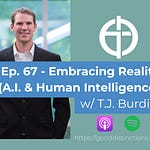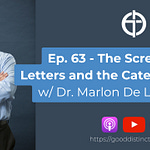Summary
In this conversation, Samantha Stephenson discusses her interest in bioethics and how she became involved in the field. She explains the appeal of dystopian fiction and its connection to bioethical issues. Samantha also delves into the problems with in vitro fertilization (IVF) and the impact on women's health and the dignity of the child. She highlights the alternative option of NaPro Technology for addressing infertility. Lastly, she explores the concept of artificial wombs and the ethical considerations surrounding their use.
In this conversation, Samantha Stephenson and Will Wright discuss the ethical implications of in vitro fertilization (IVF) and related technologies. They explore the dilemma of frozen embryos and the lack of resolution for their fate. They also delve into the impact of IVF on the unity within marriage and the potential for reproductive infidelity. Additionally, they discuss the astonishing realities of genetic editing and cloning, including the creation of mini brains with developed eyes and the splicing of human DNA into animals.
Takeaways
Bioethics explores the intersection of reason, faith, and moral issues.
Dystopian fiction provides a platform to discuss bioethical topics and imagine the consequences of certain practices.
In vitro fertilization (IVF) undermines women's health and the dignity of the child.
NaPro Technology offers an alternative solution for infertility that respects the dignity of both women and children.
The development of artificial wombs raises ethical questions about the role of maternal touch and the potential for commodification of human life. The issue of frozen embryos presents an unresolvable problem, as there is currently no clear solution for their fate.
IVF can disrupt the unity within marriage, particularly when one spouse reproduces without the other, leading to feelings of reproductive infidelity.
The advancements in genetic editing and cloning raise ethical concerns, such as the potential exploitation of clones as organ donors and the lack of community and relationships for cloned individuals.
Chapters
00:00 Introduction
00:45 Interest in Bioethics
03:41 Exploring Bioethical Issues
08:50 Dystopia and Bioethics
09:34 The Appeal of Dystopian Fiction
12:01 IVF and Women's Health
17:12 The Dignity of the Child
20:17 Napro Technology
28:22 The Problems with IVF
33:23 Embryo Adoption
39:03 Artificial Wombs
43:51 The Dilemma of Frozen Embryos
50:36 IVF and the Unity Within Marriage
01:02:23 The Astonishing Realities of Genetic Editing and Cloning
Resources:
Follow Samantha here!
There is an episode of Samantha’s with Dr. Monique Ruberu mentioned in today’s Good Distinctions episode, that can be found here:
More resources (audio on YouTube):
I Have 3 Kids Via IVF but I Don't Recommend It
Can Catholics Adopt EMBRYOS??
How IVF and Surrogacy DAMAGE Children
IVF: Why NOT with Dr. Monique Ruberu
They're all on this playlist!
Documents:
Dignitas Personae, and
Samantha’s book Reclaiming Motherhood from a Culture Gone Mad (chs 9-11 cover these issues in more detail).












